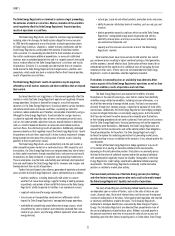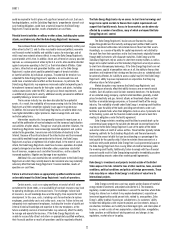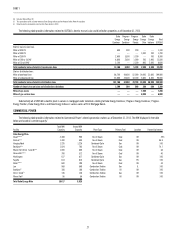Duke Energy 2012 Annual Report Download - page 39
Download and view the complete annual report
Please find page 39 of the 2012 Duke Energy annual report below. You can navigate through the pages in the report by either clicking on the pages listed below, or by using the keyword search tool below to find specific information within the annual report.
PART I
19
The Duke Energy Registrants’ franchised electric revenues, earnings
and results are dependent on state legislation and regulation that affect
electric generation, transmission, distribution and related activities, which
may limit their ability to recover costs.
The Duke Energy Registrants’ franchised electric businesses are regulated
on a cost-of-service/rate-of-return basis subject to the statutes and regulatory
commission rules and procedures of North Carolina, South Carolina, Florida,
Ohio, Indiana and Kentucky. If the Duke Energy Registrants’ franchised electric
earnings exceed the returns established by the state regulatory commissions,
retail electric rates may be subject to review and possible reduction by the
commissions, which may decrease the Duke Energy Registrants’ future
earnings. Additionally, if regulatory bodies do not allow recovery of costs
incurred in providing service on a timely basis, the Duke Energy Registrants’
future earnings could be negatively impacted.
If legislative and regulatory structures were to evolve in such a way
that the Duke Energy Registrants’ exclusive rights to serve their franchised
customers were eroded, their future earnings could be negatively impacted.
The Duke Energy Registrants’ plans for future expansion and
modernization of their generation fl eet subject them to risk of failure
to adequately execute and manage their signifi cant construction plans,
as well as the risk of not recovering all costs or of recovering costs
in an untimely manner, which could materially impact their results of
operations, cash fl ows or fi nancial position.
The completion of the Duke Energy Registrants’ anticipated capital
investment projects in existing and new generation facilities is subject to many
construction and development risks, including, but not limited to, risks related to
fi nancing, obtaining and complying with terms of permits, meeting construction
budgets and schedules, and satisfying operating and environmental performance
standards. Moreover, the Duke Energy Registrants’ ability to recover all these costs
and recovering costs in a timely manner could materially impact the Duke Energy
Registrants’ consolidated fi nancial position, results of operations or cash fl ows.
Deregulation or restructuring in the electric industry may result in
increased competition and unrecovered costs that could adversely affect
the Duke Energy Registrants’ fi nancial position, results of operations or
cash fl ows and their utility businesses.
Increased competition resulting from deregulation or restructuring efforts,
including from the Energy Policy Act of 2005, could have a signifi cant adverse
fi nancial impact on the Duke Energy Registrants and consequently on their
results of operations, fi nancial position, or cash fl ows. Increased competition
could also result in increased pressure to lower costs, including the cost of
electricity. Retail competition and the unbundling of regulated energy and gas
service could have a signifi cant adverse fi nancial impact on the Duke Energy
Registrants due to an impairment of assets, a loss of retail customers, lower
profi t margins or increased costs of capital. The Duke Energy Registrants cannot
predict the extent and timing of entry by additional competitors into the electric
markets. The Duke Energy Registrants cannot predict when they will be subject
to changes in legislation or regulation, nor can they predict the impact of these
changes on their fi nancial position, results of operations or cash fl ows.
The ability of the Duke Energy Registrants to recover signifi cant costs
resulting from severe weather events is subject to regulatory oversight,
and the timing and amount of any such recovery is uncertain and may
impact their fi nancial condition, results of operations and cash fl ows.
The Duke Energy Registrants are subject to incurring signifi cant costs
resulting from damage sustained during severe weather events. If the Duke
Energy Registrants cannot recover costs associated with future severe weather
events in a timely manner, or in an amount suffi cient to cover our actual
costs, their fi nancial condition, results of operations and cash fl ows could be
materially and adversely impacted.
Energy conservation could negatively impact the Duke Energy Registrants’
fi nancial results.
Certain regulatory and legislative bodies have introduced or are
considering requirements and/or incentives to reduce energy consumption
by certain dates. Additionally, technological advances driven by federal laws
mandating new levels of energy effi ciency in end-use electric devices or other
improvements in or applications of technology could lead to declines in per
capita energy consumption. To the extent conservation results in reduced
energy demand or signifi cantly slows the growth in demand, the Duke Energy
Registrants’ unregulated business activities could be adversely impacted. In
the Duke Energy Registrants’ regulated operations, conservation could have
a negative impact depending on the regulatory treatment of the associated
impacts. The Duke Energy Registrants currently have energy-effi ciency riders in
place to recover the cost of energy-effi ciency programs in North Carolina, South
Carolina, Florida, Ohio and Kentucky. Should the Duke Energy Registrants be
required to invest in conservation measures that result in reduced sales from
effective conservation, regulatory lag in adjusting rates for the impact of these
measures could have a negative fi nancial impact.
The Duke Energy Registrants’ businesses are subject to extensive federal
regulation that will affect their operations and costs.
The Duke Energy Registrants are subject to regulation by FERC, the NRC
and various other federal agencies. Regulation affects almost every aspect of
the Duke Energy Registrants’ businesses, including, among other things, their
ability to: take fundamental business management actions; determine the
terms and rates of transmission and distribution services; make acquisitions;
issue equity or debt securities; engage in transactions with other subsidiaries
and affi liates; and the ability of the operating subsidiaries to pay dividends to
the Duke Energy Registrants. Changes to these regulations are ongoing, and the
Duke Energy Registrants cannot predict the future course of changes in this
regulatory environment or the ultimate effect that this changing regulatory
environment will have on their businesses. However, changes in regulation
(including re-regulating previously deregulated markets) can cause delays in or
affect business planning and transactions and can substantially increase the
Duke Energy Registrants’ costs.
The Duke Energy Registrants are subject to numerous environmental laws
and regulations that require signifi cant capital expenditures that can
increase cost of operations, and which may impact or limit business plans,
or cause exposure to environmental liabilities.
The Duke Energy Registrants are subject to numerous environmental
laws and regulations affecting many aspects of their present and future
operations, including air emissions, water quality, wastewater discharges,
solid waste and hazardous waste. These laws and regulations can result in
increased capital, operating, and other costs. These laws and regulations
generally require the Duke Energy Registrants to obtain and comply with a wide
variety of environmental licenses, permits, inspections and other approvals.
Compliance with environmental laws and regulations can require signifi cant
expenditures, including expenditures for cleanup costs and damages arising
from contaminated properties, and failure to comply with environmental
regulations may result in the imposition of fi nes, penalties and injunctive
measures affecting operating assets. The steps the Duke Energy Registrants
could be required to take to ensure that their facilities are in compliance could
be prohibitively expensive. As a result, the Duke Energy Registrants may be
























